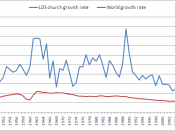What does it mean to be lost? Imagine the terror of being lost - in a trackless mountain wilderness, or alone at sea. Even the feeling of being hopelessly entangled or trapped in personal conditions or circumstances - alcoholism, cancer, divorce - alone, and lost.
Imagine too, those who are away from the Father and haven't found the way to Him. The Bible calls these people "lost". Jesus saw the crowds of people around Him as sheep without a shepherd. They were helpless and hopeless, and He was deeply moved.
So imagine, then, the lostness of those who are trapped and do not even know it. Consider those who do not look for salvation. They do not recognise it when it comes. They do not accept it when offered. That is being lost.
Recall the studies from elsewhere in this course, 1 out of 10 of the world's population are Bible-believing Christians 2 out of 10 of the world's population are Christians who need to be renewed or reevangelised 3 out of 10 of the world's population are non-Christians within the reach of Christian people 4 out of 10 of the world's population are outside the reach of Christians of their own people 70% of the world's population then, are lost.
They do not have salvation. 30% of people have not heard with understanding the way to life in Christ. 40% of people cannot hear because there is no one near enough to tell them. Our question is then, are these people really lost? If they have never heard, have they never had a chance? Are any of them lost? Are all of them lost? Throughout Church history there have been those who teach that none will be lost (Universalism), ultimately God will save all, because God is good. There are philosophical problems with this teaching, however - mainly, it undermines belief in the atonement of Christ. If all sin will ultimately be overlooked then Christ should never have died. Further, the Scriptures are explicit that a division occurs after death between those who have been reconciled with God and those who have not. The Universalist position does not take seriously the message of the Bible and removes any necessity for preaching and missionary endeavour. Why did Christ make missions the primary purpose of the Church if all will ultimately find acceptance with God with or without the gospel? Due to this discrepancy, there are those who promote not universalism but a "Wider Hope". Not all will be saved - but many who have not heard of Christ will be saved because God is just and will not condemn the sincere seeker of truth. This view has been expanded to teach that those who live by the light they may have will be saved on the merits of Christ's death through general revelation (see below), or they will be given a chance at death or after death. The problem with this view is that preaching the gospel becomes almost criminal - because those who may reject will be damned and would have been best not hearing the gospel at all - the good news becomes bad news! In any event, there is no urgency to preach to those who may well be saved without knowledge of salvation.
It is important to discuss the concept of general revelation, mentioned above. This means that God's presence and reality is shown by nature and creation itself, as explained in Psalm 19:1-5 The heavens are telling of the glory of God; and their expanse is declaring the work of His hands. Day to day pours forth speech, and night to night reveals knowledge. There is no speech, nor are there words; their voice is not heard. Their voice has gone out through all the earth, and their utterances to the end of the world. In them He has placed a tent for the sun, which is as a bridegroom coming out of his chamber; it rejoices as a strong man to run his course.
and Romans 1:18-20, For the wrath of God is revealed from heaven against all ungodliness and unrighteousness of men who suppress the truth in unrighteousness, because that which is known about God is evident within them; for God made it evident to them. For since the creation of the world His invisible attributes, His eternal power and divine nature, have been clearly seen, being understood through what has been made, so that they are without excuse.
An application of general revelation is described in Acts 14:14-17, But when the apostles Barnabas and Paul heard of it, they tore their robes and rushed out into the crowd, crying out and saying, "Men, why are you doing these things? We are also men of the same nature as you, and preach the gospel to you that you should turn from these vain things to a living God, who made the heavens and the earth and the sea and all that is in them. "In the generations gone by He permitted all the nations to go their own ways; and yet He did not leave Himself without witness, in that He did good and gave you rains from heaven and fruitful seasons, satisfying your hearts with food and gladness." It is because of God the people had rain, and hence fruitful seasons, and hence food, and hence gladness. By contrast, special revelation is the testimony of Scripture and the Lord Jesus Christ Himself. Special revelation speaks clearly of God's atoning purposes and the way of redemption.








